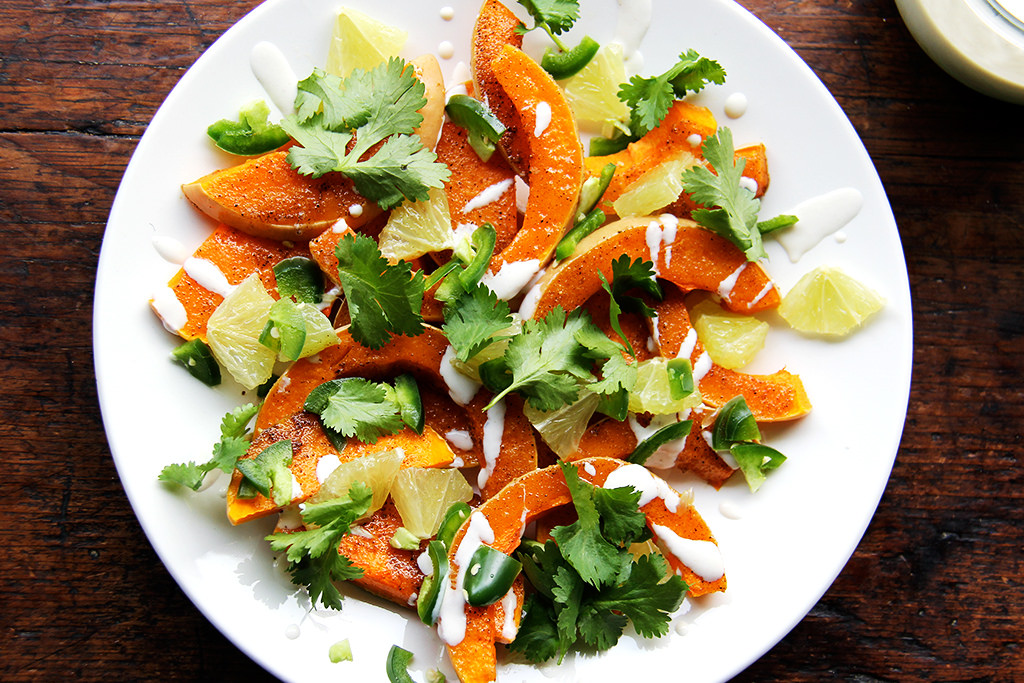Winter is coming and we’re serious about keeping farmers market produce on the menu. Alexandra Stafford of Alexandra Cooks shows us how to store, prep, and make the most of it, without wasting a scrap.
Yotam Ottolenghi prefaced this recipe from Plenty with a one-sentence endorsement: “This dish is the most refreshing way I can think of to start a meal.”
Upon reading this bold statement, I jumped to the ingredient list to learn more, and while I should know by now not to question the master of refreshing flavors, I had my doubts: butternut squash, tahini, yogurt, lime, jalapeños, allspice, and cilantro? This is not the flavor profile I expect or crave this time of year.
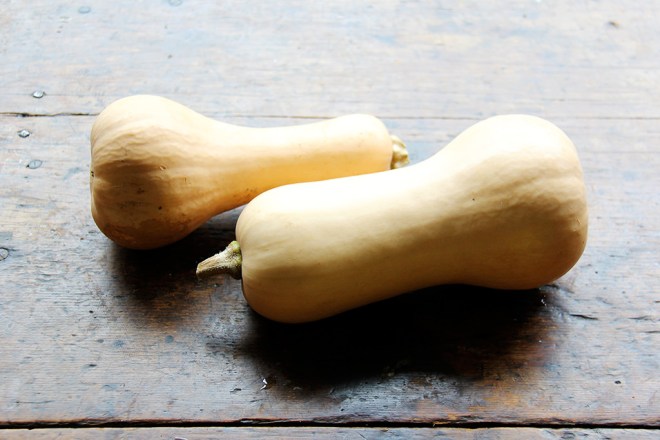
Alexandra Stafford
Leave it to Ottolenghi, however, to push us outside our fall comfort zone of sage and brown butter, pairing one of our most-adored winter squashes with flavors we often associate with sunnier days — with tacos, or Vietnamese summer rolls.
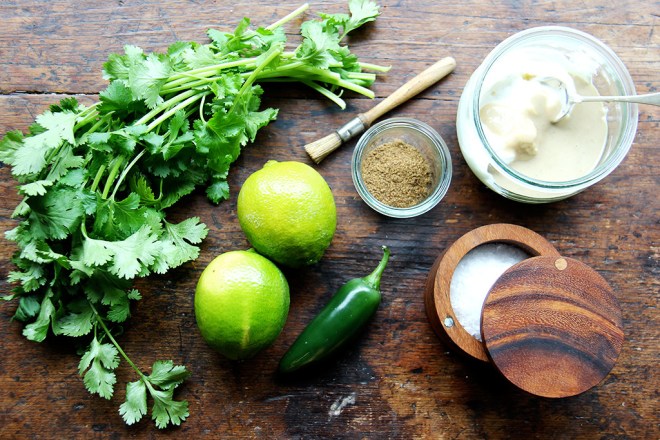
Alexandra Stafford
These butternut squash slices, roasted with cardamom and allspice (or any other sweet, wintry spice, like nutmeg or cloves) are served at room temperature, drizzled with a cool yogurt-tahini sauce, and showered with cilantro and slices of jalapeños and peeled, whole lime wedges — no ingredient in this recipe plays a subtle role.
As you make this, you’ll have to forget your instincts. The yogurt sauce on its own might taste a little flat and bitter, tempting you to add more lime juice or maybe a dash of something sweet. But, at least the first time you make this, try to refrain. Remember, the roasted butternut squash will provide the sweetness; and the lime slices, the acid. The balance of sweet, tangy, spicy, bitter, salty, and fresh arises when you start eating. And although the thought of eating whole lime segments and jalapeño slices might feel scary, these are the bits you’ll find yourself reaching for more of — be sure to keep extra fixings on the table.
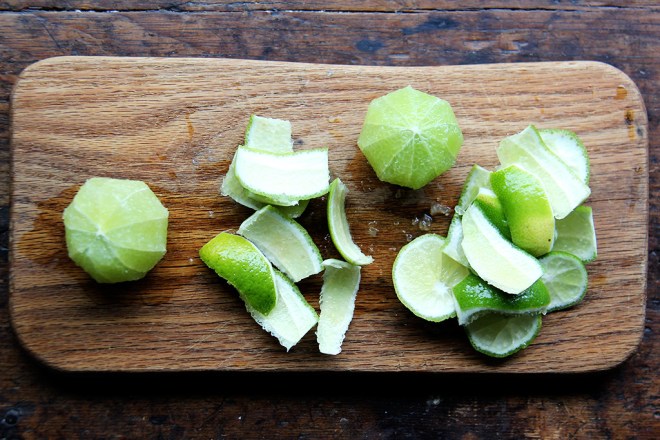
Alexandra Stafford
For many of you, soups and stews, risottos and ravioli might be dominating your cooking dreams at the moment. If this is the case, file this recipe away for February, when you’ve had your fill of comfort, when spring break lurks on the horizon, when warmer days cannot arrive a day too soon. Butternut squash will never taste so refreshing.
To store your butternut squash:
If your kitchen is cool (50 to 60 degrees F), whole butternut squash can be stored at room temperature for months. Once squash has been cut, transfer it to a bag or wrap it in plastic wrap and store it in the refrigerator.
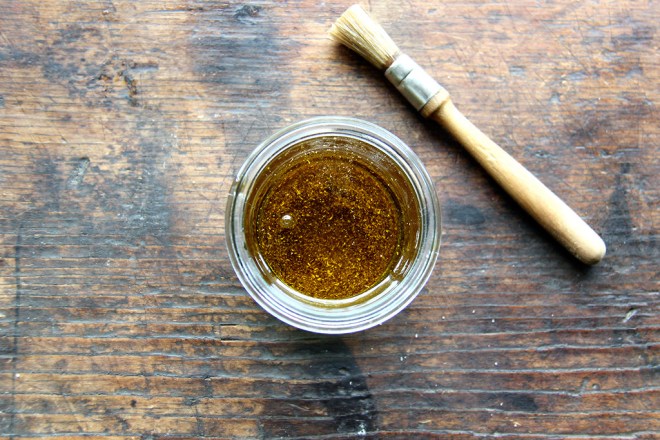
Alexandra Stafford
To prep your butternut squash:
Butternut squash can be prepped for cooking in countless ways: skin-on, halved, and seeded; peeled, seeded, and diced or sliced; left whole, poked with holes (for the microwave). Generally, the seeds are removed before cooking, but they can be left intact while roasting and scooped out before serving. No matter what, save the seeds!
Place the seeds in a colander and run water over them until they are mostly clean. If they still feel slimy, transfer them to a bowl of cold water and let them sit for five to 10 minutes. Let the slimy bits fall to the bottom of the bowl. Scoop out the seeds floating at the top of the water with your hands and transfer them to a clean dish towel. Dry them as best you can. Season the seeds with olive oil (or butter or coconut oil), salt, spices, sugar, etc., and bake them on a parchment-lined baking sheet for 30 minutes at 325 degrees F. Remove them from the oven and stir, then return them to the oven and continue to roast for 10 to 15 minutes longer.
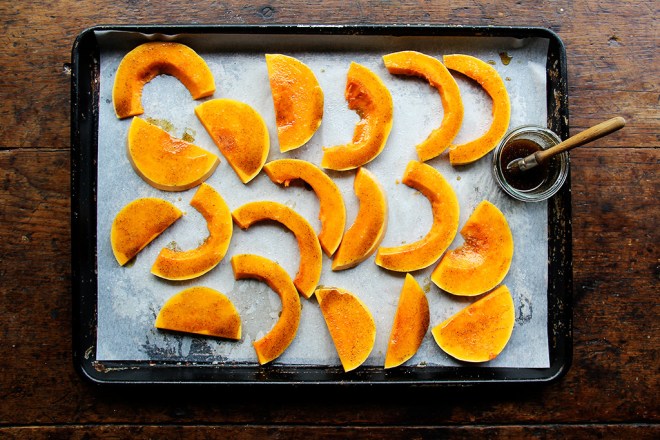
Alexandra Stafford
To cook your butternut squash:
Most simply, butternut squash can be halved lengthwise, seeded, brushed with olive oil, and baked flesh side-down at 375 degrees F or until tender, 30 to 40 minutes. The flesh can be scooped and eaten with minimal seasoning (salt, pepper, butter) or used for various other recipes:
Roasted butternut squash can be folded into a galette; or puréed with tahini and lemon into hummus; or puréed with cream, mixed with cheeses, tossed with pancetta and al dente pasta, and finished in a screaming hot oven. It can also be mixed with chipotles and cream and baked into a gratin or mixed with herbs and cheeses and used as a filling for ravioli dressed with brown butter and crispy sage.
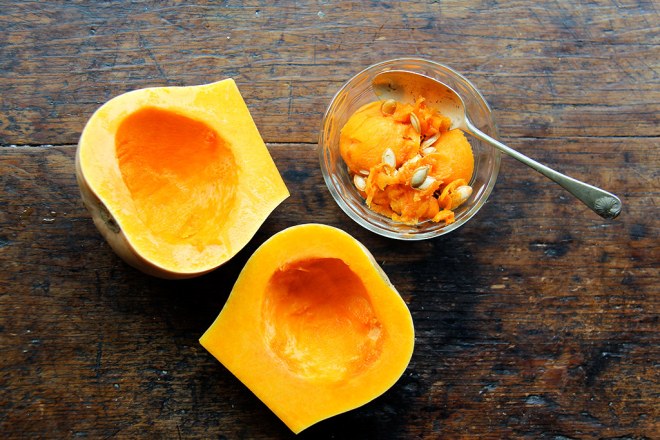
Alexandra Stafford
Butternuts can also be peeled, seeded, and cubed or sliced before being roasted or sautéed. The cooked squash pieces can be layered over pizza, or topped with a sage, hazelnut, and ricotta salata pesto, or tossed with kale for a make-ahead winter salad.
Peeled, raw, cubed butternut squash can be simmered in stock until tender and puréed into a light soup with cider and sour cream, added during the final cooking stage of a slow-cooked stew, or baked into a no-fuss oven risotto. Raw squash can also be steam-sautéed in olive oil, then mashed into a purée with heavy cream or mixed with an onion jam and spooned over ricotta-smeared toasts.
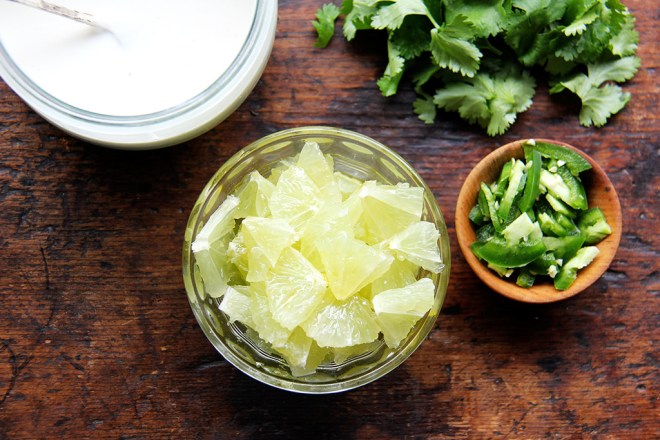
Alexandra Stafford
Peeled and thinly sliced raw butternut squash can be layered with parsnips and potatoes or any other root vegetables you have on hand and baked into a gratin. Paper-thin slices of butternut squash can also be tossed with olive oil, herbs, and salt and slow-roasted into chips.
Cubed raw butternut squash can be tossed with sugar, refrigerated for 2 days, and eaten like candy.
Last but not least: Like pumpkin, butternut squash can also be cooked (in the microwave or the oven), puréed, and used in baked goods like the following:
- Butternut Sage Scones
- Brown Butter and Butternut Loaf
- Butternut Squash Pie with Almond Meal and Cinnamon
- Gluten-Free Coconut Squash Cake
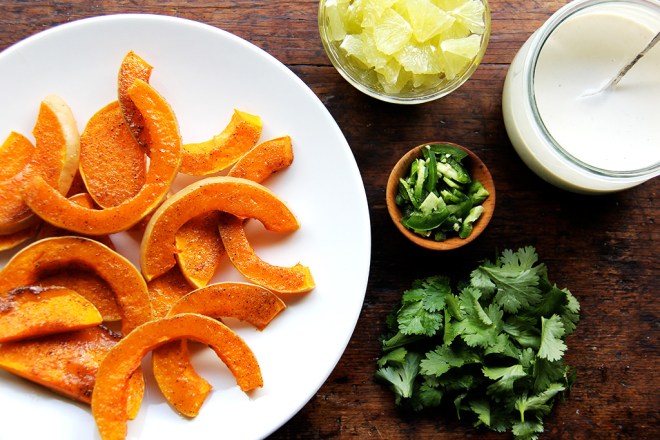
Alexandra Stafford
Roasted Butternut Squash with Sweet Spices, Lime, and Green Chile
See the full recipe (and save and print it) here.
Serves 4 to 6 as a first course
2 limes + 1 tablespoon fresh lime juice, divided
Maldon sea salt
4 tablespoons olive oil, divided
1 medium butternut squash, about 2 pounds
1 teaspoon garam masala
1/2 cup Greek yogurt
2 1/2 tablespoons tahini
1 green chile, such as a jalapeño, thinly sliced (I give the slices a rough chop, too)
2/3 cup picked cilantro leaves

